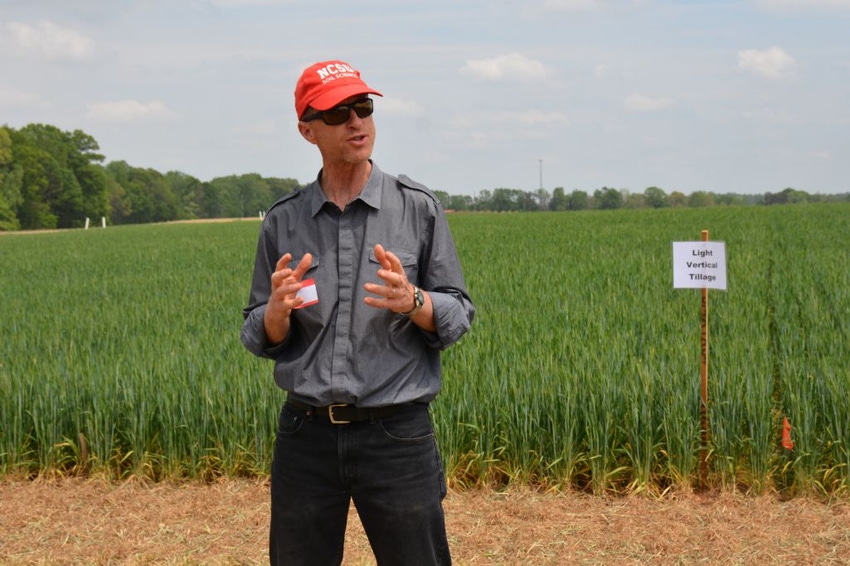
North Carolina State University has begun a 10-year study at the Piedmont Research Station in Salisbury to see how vertical tillage might be used to increase yields and improve soil health.
Alan Franzluebbers, a USDA Agricultural Research Service soil scientist at North Carolina State University, said the study was implemented by the North Carolina Department of Agriculture due to a strong interest in vertical tillage from farmers in the Piedmont. In vertical tillage, surface crop residues are cut up and only lightly incorporated with soil. Vertical tillage could allow for a more uniform wheat stand following crops with heavy residues, and therefore higher yields.
Franzluebbers said vertical tillage works well with no-tillage, allowing farmers to otherwise maintain no-tillage in their operations. “The soil is not inverted, just lightly cut at the surface. The implements are just running through the soil, not turning it over,” Franzluebbers explained at the 2016 Central Piedmont Small Grains Field Day at the Piedmont Research Station in Salisbury.
In the study, N.C. State will compare light turbo tillage or vertical tillage and heavy turbo tillage to no tillage, which has been utilized at the station for a number of years now. The study is a collaboration among N.C. State, N.C. Department of Agriculture, N.C. Cooperative Extension, and USDA-Natural Resources Conservation Service.
“We are interested in improving the health of soil,” Franzluebbers said. “Our soils in the Piedmont have undergone a lot of degradation over the past century. But it’s a great resource. We have a good climate in general and the soils are responsive to management. The idea behind soil health, soil quality and soil management is that we can and should take care of the soil that we are given,” Franzluebbers said.
“The fortunate thing that has happened with the extensive erosion is that we learned a lesson. We cannot let soil erode away anymore. It’s not to our advantage. What happens is that our crops simply burn up. Water is just not utilized effectively. Crops need to have water and this surface protection with organic matter is very important,” Franzluebbers stressed.
Maintaining residue and keeping soil covered is vital for long-term soil sustainability. Through management, farmers can improve soil health, Franzluebbers said. The first principle in soil health is to not disturb the soil, while the second principle is to have crop diversification.
Franzluebbers sees possible benefits of turbo tillage because it allows farmers to otherwise maintain no-tillage, which offers many great advantages for the soil. Lightly covering small-seeded cover crop seeds following crop harvest may be one benefit. “No-tillage allows the organisms in the soil to survive. If you churn over the soil, they don’t survive because the soil dries out, the soil heats up, which kills all the beneficial organisms,” he said.
About the Author(s)
You May Also Like






